Hosted by TruLight Ministries – The Place of Truth

God is Omniscient / Alwetend
Omniscience is defined as “the state of having total knowledge, the quality of knowing everything.” For God to be sovereign over His creation of all things, whether visible or invisible, He has to be all-knowing. His omniscience is not restricted to any one person in the Godhead—Father, Son, and Holy Spirit are all by nature omniscient.
God knows everything (1 John 3:20). He knows not only the minutest details of our lives but those of everything around us, for He mentions even knowing when a sparrow falls or when we lose a single hair (Matthew 10:29-30). Not only does God know everything that will occur until the end of history itself (Isaiah 46:9-10), but He also knows our very thoughts, even before we speak forth (Psalm 139:4). He knows our hearts from afar; He even saw us in the womb (Psalm 139:1-3, 15-16). Solomon expresses this truth perfectly when he says, “For you, you only, know the hearts of all the children of mankind” (1 Kings 8:39).
Despite the condescension of the Son of God to empty Himself and make Himself nothing (Philippians 2:7), His omniscience is clearly seen in the New Testament writings. The first prayer of the apostles in Acts 1:24, “Lord, you know everyone’s heart,” implies Jesus’ omniscience, which is necessary if He is to be able to receive petitions and intercede at God’s right hand. On earth, Jesus’ omniscience is just as clear. In many Gospel accounts, He knew the thoughts of his audience (Matthew 9:4; 12:25; Mark 2:6-8; Luke 6:8). He knew about people’s lives before He had even met them. When He met the woman collecting water at the well at Sychar, He said to her, “The fact is you have had five husbands, and the man you now have is not your husband” (John 4:18). He also tells His disciples that their friend Lazarus was dead, although He was over 25 miles away from Lazarus’s home (John 11:11-15). He advised the disciples to go and make preparation for the Lord’s Supper, describing the person they were to meet and follow (Mark 14:13-15). Perhaps best of all, He knew Nathanael before ever meeting him, for He knew his heart (John 1:47-48).
Clearly, we observe Jesus’ omniscience on earth, but this is where the paradox begins as well. Jesus asks questions, which imply the absence of knowledge, although the Lord asks questions more for the benefit of His audience than for Himself. However, there is another facet regarding His omniscience that comes from the limitations of the human nature which He, as Son of God, assumed. We read that as a man He “grew in wisdom and stature” (Luke 2:52) and that He learned “obedience through suffering” (Hebrews 5:8). We also read that He did not know when the world would be brought to an end (Matthew 24:34-36). We, therefore, have to ask, why would the Son not know this, if He knew everything else? Rather than regarding this as just a human limitation, we should regard it as a controlled lack of knowledge. This was a self-willed act of humility in order to share fully in our nature (Philippians 2:6-11; Hebrews 2:17) and to be the Second Adam.
Finally, there is nothing too hard for an omniscient God, and it is on the basis of our faith in such a God that we can rest secure in Him, knowing that He promises never to fail us as long as we continue in Him. He has known us from eternity, even before creation. God knew you and me, where we would appear in the course of time, and whom we would interact with. He even foresaw our sin in all its ugliness and depravity, yet, in love, He set his seal upon us and drew us to that love in Jesus Christ (Ephesians 1:3-6). We shall see Him face to face, but our knowledge of Him will never be complete. Our wonder, love and praise of Him shall go on for all millennia as we bask in the rays of His heavenly love, learning and appreciating more and more of our omniscient God.
Alwetendheid word gedefinieer as “die toestand van totale kennis, die kwaliteit om alles te weet.” Vir God om soewerein te wees oor Sy skepping van alle dinge, of dit nou sigbaar of onsigbaar is, moet Hy alwetend wees. Sy alwetendheid is nie beperk tot enige een persoon in die Godheid nie – Vader, Seun en Heilige Gees is almal van nature alwetend.
God weet alles (1 Johannes 3:20). Hy ken nie net die kleinste besonderhede van ons lewens nie, maar ook dié van alles rondom ons, want Hy noem selfs dat ons weet wanneer ‘n mossie val of wanneer ons ‘n enkele haar verloor (Matteus 10:29-30). God weet nie net alles wat tot die einde van die geskiedenis self sal gebeur nie (Jesaja 46:9-10), maar Hy ken ook ons gedagtes, selfs voordat ons praat (Psalm 139:4). Hy ken ons harte van ver af; Hy het ons selfs in die moederskoot gesien (Psalm 139:1-3, 15-16). Salomo druk hierdie waarheid perfek uit wanneer hy sê: “Want U alleen ken die harte van al die mensekinders” (1 Konings 8:39).
Ten spyte van die neerbuigende gedrag van die Seun van God om Homself te verneder en Homself tot niet te maak (Filippense 2:7), word Sy alwetendheid duidelik gesien in die Nuwe Testamentiese geskrifte. Die eerste gebed van die apostels in Handelinge 1:24, “Here, U ken elkeen se hart,” impliseer Jesus se alwetendheid, wat nodig is as Hy versoeke wil ontvang en aan God se regterhand wil intree. Op aarde is Jesus se alwetendheid net so duidelik. In baie Evangelieverslae het Hy die gedagtes van sy gehoor geken (Matteus 9:4; 12:25; Markus 2:6-8; Lukas 6:8). Hy het van mense se lewens geweet voordat Hy hulle selfs ontmoet het. Toe Hy die vrou ontmoet wat water by die put in Sigar gaan haal het, het Hy vir haar gesê: “Jy het vyf mans gehad, en die man wat jy nou het, is nie jou man nie” (Johannes 4:18). Hy vertel ook vir Sy dissipels dat hulle vriend Lasarus dood was, alhoewel Hy meer as 40 kilometer van Lasarus se huis af was (Johannes 11:11-15). Hy het die dissipels aangeraai om te gaan voorberei vir die Nagmaal en die persoon te beskryf wat hulle moes ontmoet en volg (Markus 14:13-15). Miskien die beste van alles is dat Hy Natanael geken het voordat hy hom ooit ontmoet het, want Hy het sy hart geken (Johannes 1:47-48).
Dit is duidelik dat ons Jesus se alwetendheid op aarde waarneem, maar dit is ook waar die paradoks begin. Jesus vra vrae, wat die afwesigheid van kennis impliseer, alhoewel die Here vrae meer vra tot voordeel van Sy gehoor as vir Homself. Daar is egter nog ‘n faset rakende Sy alwetendheid wat voortspruit uit die beperkings van die menslike natuur wat Hy, as Seun van God, aangeneem het. Ons lees dat Hy as mens “in wysheid en gestalte gegroei het” (Lukas 2:52) en dat Hy “gehoorsaamheid deur lyding” geleer het (Hebreërs 5:8). Ons lees ook dat Hy nie geweet het wanneer die wêreld tot ‘n einde sou kom nie (Matteus 24:34-36). Ons moet dus vra, waarom sou die Seun dit nie weet as Hy alles anders geweet het nie? Eerder as om dit as net ‘n menslike beperking te beskou, moet ons dit as ‘n beheerste gebrek aan kennis beskou. Dit was ‘n eiewillige daad van nederigheid om ten volle in ons natuur te deel (Filippense 2:6-11; Hebreërs 2:17) en om die Tweede Adam te wees.
Laastens, daar is niks te moeilik vir ‘n alwetende God nie, en dit is op grond van ons geloof in so ‘n God dat ons veilig in Hom kan rus, wetende dat Hy belowe om ons nooit te teleur te stel solank ons in Hom bly nie. Hy ken ons van ewigheid af, selfs voor die skepping. God het jou en my geken, waar ons mettertyd sou verskyn, en met wie ons sou interaksie hê. Hy het selfs ons sonde in al sy lelikheid en verdorwenheid voorsien, maar in liefde het Hy sy seël op ons gesit en ons na daardie liefde in Jesus Christus getrek (Efesiërs 1:3-6). Ons sal Hom van aangesig tot aangesig sien, maar ons kennis van Hom sal nooit volledig wees nie. Ons verwondering, liefde en lof van Hom sal vir alle millennia voortduur terwyl ons in die strale van Sy hemelse liefde baai, en meer en meer van ons alwetende God leer en waardeer.
Bible Verse and Prayer for Today;

Continue in prayer, and watch in the same with thanksgiving.
Colossians 4:2
Prayer
Lord . Somethimes we Forget , that Prayer is the way we communicate with You in Heaven . Our Communication should be with You daily and not just weekly or when we need your Heavenly Healing or Guidance or Protection . we Should come to You in Prayer about everything , The Good and the Bad , the Blessings we receive should always be a Thanksgiving Prayer and not only the Prayers with Grocery lists and requests . No Prayer Communication without Thanksgiving . Please teach us to have effective Communication with You Lord like Jesus did . we Pray this in Jesus name . Amen and Amen
Bybel Vers en Gebed vir Vandag
Hou aan bid en waak daarin met danksegging.
Kolossense 4:2
Gebed
Here. Soms vergeet ons dat gebed die manier is waarop ons met U in die Hemel kommunikeer. Ons kommunikasie moet daagliks met U wees en nie net weekliks of wanneer ons u hemelse genesing, leiding of beskerming nodig het nie. Ons moet na U toe kom in gebed oor alles, die goeie en die slegte. Die seëninge wat ons ontvang, moet altyd ‘n dankseggingsgebed wees en nie net die gebede met kruidenierslyste en versoeke nie. Geen gebedskommunikasie sonder danksegging nie. Leer ons asseblief om effektiewe kommunikasie met U te hê, Here, soos Jesus gedoen het. Ons bid dit in Jesus se naam. Amen en Amen.

Bible Teaching of the Day
Can a true Christian be Carnal?
In answering this question, let’s first define the term “carnal.” The word “carnal” is translated from the Greek word sarkikos, which literally means “fleshly.” This descriptive word is seen in the context of Christians in 1 Corinthians 3:1-3. In this passage, the apostle Paul is addressing the readers as “brethren,” a term he uses almost exclusively to refer to other Christians; he then goes on to describe them as “carnal.” Therefore, we can conclude that Christians can be carnal. The Bible is absolutely clear that no one is sinless (1 John 1:8). Every time we sin, we are acting carnally.
The key thing to understand is that while a Christian can be, for a time, carnal, a true Christian will not remain carnal for a lifetime. Some have abused the idea of a “carnal Christian” by saying that it is possible for people to come to faith in Christ and then proceed to live the rest of their lives in a completely carnal manner, with no evidence of being born again or a new creation (2 Corinthians 5:17). Such a concept is completely unbiblical. James 2 makes it abundantly clear that genuine faith will always result in good works. Ephesians 2:8-10 declares that while we are saved by grace alone through faith alone, that salvation will result in works. Can a Christian, in a time of failure and/or rebellion, appear to be carnal? Yes. Will a true Christian remain carnal? No.
Since eternal security is a fact of Scripture, even the carnal Christian is still saved. Salvation cannot be lost, because salvation is a gift of God that He will not take away (see John 10:28; Romans 8:37-39; 1 John 5:13). Even in 1 Corinthians 3:15, the carnal Christian is assured of salvation: “If anyone’s work is burned, he will suffer loss; but he himself will be saved, yet so as through fire.” The question is not whether a person who claims to be a Christian but lives carnally has lost his salvation, but whether that person was truly saved in the first place (1 John 2:19).
Christians who become carnal in their behavior can expect God to lovingly discipline them (Hebrews 12:5-11) so they can be restored to close fellowship with Him and be trained to obey Him. God’s desire in saving us is that we would progressively grow closer to the image of Christ (Romans 12:1-2), becoming increasingly spiritual and decreasingly carnal, a process known as sanctification. Until we are delivered from our sinful flesh, there will be outbreaks of carnality. For a genuine believer in Christ, though, these outbreaks of carnality will be the exception, not the rule.
Bybel Lering vir die Dag
Kan ‘n ware Christen vleeslik wees?
Om hierdie vraag te beantwoord, laat ons eers die term “vleeslik” definieer. Die woord “vleeslik” word vertaal van die Griekse woord sarkikos, wat letterlik “vleeslik” beteken. Hierdie beskrywende woord word gesien in die konteks van Christene in 1 Korintiërs 3:1-3. In hierdie gedeelte spreek die apostel Paulus die lesers aan as “broeders”, ‘n term wat hy amper uitsluitlik gebruik om na ander Christene te verwys; hy beskryf hulle dan as “vleeslik”. Daarom kan ons tot die gevolgtrekking kom dat Christene vleeslik kan wees. Die Bybel is absoluut duidelik dat niemand sondeloos is nie (1 Johannes 1:8). Elke keer as ons sondig, tree ons vleeslik op.
Die belangrikste ding om te verstaan is dat terwyl ‘n Christen vir ‘n tyd vleeslik kan wees, ‘n ware Christen nie vir ‘n leeftyd vleeslik sal bly nie. Sommige het die idee van ‘n “vleeslike Christen” misbruik deur te sê dat dit moontlik is vir mense om tot geloof in Christus te kom en dan voort te gaan om die res van hul lewens op ‘n heeltemal vleeslike manier te leef, sonder enige bewyse van wedergeboorte of ‘n nuwe skepping (2 Korintiërs 5:17). So ‘n konsep is heeltemal onbybels. Jakobus 2 maak dit baie duidelik dat ware geloof altyd tot goeie werke sal lei. Efesiërs 2:8-10 verklaar dat terwyl ons deur genade alleen deur geloof alleen gered word, daardie verlossing tot werke sal lei. Kan ‘n Christen, in ‘n tyd van mislukking en/of rebellie, vleeslik voorkom? Ja. Sal ‘n ware Christen vleeslik bly? Nee.
Aangesien ewige sekuriteit ‘n feit van die Skrif is, is selfs die vleeslike Christen steeds gered. Verlossing kan nie verlore gaan nie, want verlossing is ‘n gawe van God wat Hy nie sal wegneem nie (sien Johannes 10:28; Romeine 8:37-39; 1 Johannes 5:13). Selfs in 1 Korintiërs 3:15 word die vleeslike Christen verseker van redding: “As iemand se werk verbrand word, sal hy skade ly; maar hy sal self gered word, maar soos deur vuur heen.” Die vraag is nie of iemand wat beweer dat hy ‘n Christen is, maar vleeslik leef, sy redding verloor het nie, maar of daardie persoon werklik in die eerste plek gered is (1 Johannes 2:19).
Christene wat vleeslik in hul gedrag word, kan verwag dat God hulle liefdevol sal dissiplineer (Hebreërs 12:5-11) sodat hulle herstel kan word tot noue gemeenskap met Hom en opgelei kan word om Hom te gehoorsaam. God se begeerte om ons te red, is dat ons progressief nader aan die beeld van Christus sal groei (Romeine 12:1-2), toenemend geestelik en afnemend vleeslik sal word, ‘n proses wat bekend staan as heiligmaking. Totdat ons van ons sondige vlees verlos word, sal daar uitbrake van vleeslikheid wees. Vir ‘n ware gelowige in Christus sal hierdie uitbrake van vleeslikheid egter die uitsondering wees, nie die reël nie.

Today’s Devotional
Why should I read TruLight Daily Manna every day ?
Daily devotions is a phrase used to denote the discipline of Bible reading and prayer with which Christians start or end their day. Bible reading in daily devotions can take the form of a structured study using a devotional book or a simple reading of certain passages. Some people like to read through the Bible in a year. Prayer in daily devotions can include any or all of the different types of prayer—praise, confession, thanksgiving, petition, and intercession. Some people use prayer lists for their daily devotions. Others prefer to pray as they read the Word in an interactive manner, listening for God speaking to them through the Bible passages and responding in prayer. Whatever the format of daily devotions, the important thing is that our daily devotions, as the name implies, be truly devoted to God and occur daily.
It is important to spend time with God in daily devotions. Why? Paul explains: “For God, who said, ‘Let light shine out of darkness,’ made his light shine in our hearts to give us the light of the knowledge of the glory of God in the face of Christ” (2 Corinthians 4:6). The experience of having God’s light shine in our hearts comes in our times spent in the presence of God. Of course, this light comes only from knowing God through Christ. The marvelous treasure of the Holy Spirit is given to each Christian, and we need faith to believe and act upon that truth. In all reality, if we truly yearn to experience the light of our Lord, we will need to be with God every day.
Someone once said, “The gospel brings man to God; devotions keep him close to God.” The apostle James wrote, “Come near to God and he will come near to you. Wash your hands, you sinners, and purify your hearts, you double-minded” (James 4:8). As the children of God seek a closer relationship with God, they will find God is closer than ever. In their daily devotions, Christians seek to draw close to God’s heart, understand more about Him, obey His commands, and hold on to His promises. The impure and double-minded will have no such yearning in their hearts. In fact, they will seek to separate themselves from God as much as possible.
In daily devotions, we want to draw near to God. The expression “draw near” was originally associated with the priesthood in Israel. Under the regulations of the Old Covenant, the priests represented the people before God. However, prior to approaching God’s presence, the priest had to be washed physically and be ceremonially clean. This meant he had to bathe, wear the proper garments, and offer the proper sacrifices. His own heart had to be right with God. Then he could “draw near” to God on the people’s behalf. In time, the concept of “drawing near” was applied to anyone who approached God’s presence in worship and prayer.
The sincere believer knows that God wants His people to draw near to Him with true and pure hearts, and that’s what daily devotions are all about. “Let us draw near to God with a sincere heart in full assurance of faith, having our hearts sprinkled to cleanse us from a guilty conscience and having our bodies washed with pure water” (Hebrews 10:22). This verse applies the language of the Old Testament ceremonial system to us today. Just as those ancient priests prepared themselves to be near God, we also should prepare ourselves spiritually to worship Him, whether in formal worship or in our personal devotional times.
After salvation, the spiritual growth begins. The believer will, like Enoch, naturally want to walk with God (Genesis 5:22). He will, like Asaph, desire to be near God (Psalm 73:28). He will, like the disciples, yearn to pray effectively (Luke 11:1). In short, the child of God will want to find time for daily devotions.
Vandag se Bemoediging
Waarom moet ek TruLight Daily Manna elke dag lees?
Daaglikse oordenkings is ‘n frase wat gebruik word om die dissipline van Bybellees en gebed aan te dui waarmee Christene hul dag begin of eindig. Bybellees in daaglikse oordenkings kan die vorm aanneem van ‘n gestruktureerde studie met behulp van ‘n oordenkingsboek of ‘n eenvoudige lees van sekere gedeeltes. Sommige mense hou daarvan om die Bybel in ‘n jaar deur te lees. Gebed in daaglikse oordenkings kan enige of al die verskillende tipes gebed insluit – lofprysing, belydenis, danksegging, petisie en voorbidding. Sommige mense gebruik gebedslyste vir hul daaglikse oordenkings. Ander verkies om te bid terwyl hulle die Woord op ‘n interaktiewe manier lees, luister na God wat met hulle praat deur die Bybelgedeeltes en reageer in gebed. Wat ook al die formaat van daaglikse oordenkings is, die belangrike ding is dat ons daaglikse oordenkings, soos die naam aandui, werklik aan God toegewy is en daagliks plaasvind.
Dit is belangrik om tyd saam met God deur te bring in daaglikse oordenkings. Waarom? Paulus verduidelik: “Want God, wat gesê het: Laat daar lig skyn uit die duisternis, het sy lig in ons harte laat skyn om ons die verligting te gee van die kennis van die heerlikheid van God in die aangesig van Christus” (2 Korintiërs 4:6). Die ervaring om God se lig in ons harte te laat skyn, kom in ons tye wat ons in die teenwoordigheid van God deurbring. Natuurlik kom hierdie lig slegs deur God deur Christus te ken. Die wonderlike skat van die Heilige Gees word aan elke Christen gegee, en ons het geloof nodig om daardie waarheid te glo en daarvolgens op te tree. In werklikheid, as ons werklik daarna smag om die lig van ons Here te ervaar, sal ons elke dag by God moet wees.
Iemand het eenkeer gesê: “Die evangelie bring die mens na God; toewyding hou hom naby God.” Die apostel Jakobus het geskryf: “Kom nader aan God, en Hy sal nader aan julle kom. Was julle hande, julle sondaars, en reinig julle harte, julle dubbelhartiges” (Jakobus 4:8). Soos die kinders van God ‘n nouer verhouding met God soek, sal hulle vind dat God nader as ooit tevore is. In hul daaglikse oordenkings poog Christene om nader aan God se hart te kom, meer oor Hom te verstaan, Sy gebooie te gehoorsaam en aan Sy beloftes vas te hou. Die onreine en dubbelsinniges sal geen sodanige verlange in hul harte hê nie. Trouens, hulle sal probeer om hulself soveel as moontlik van God te skei.
In daaglikse oordenkings wil ons nader aan God kom. Die uitdrukking “nader kom” is oorspronklik geassosieer met die priesterskap in Israel. Onder die regulasies van die Ou Verbond het die priesters die volk voor God verteenwoordig. Voordat die priester egter God se teenwoordigheid kon nader, moes hy fisies gewas word en seremonieel rein wees. Dit het beteken dat hy moes bad, die regte klere dra en die regte offers bring. Sy eie hart moes reg wees met God. Dan kon hy namens die volk tot God “nader kom”. Mettertyd is die konsep van “nader kom” toegepas op enigiemand wat God se teenwoordigheid in aanbidding en gebed nader.
Die opregte gelowige weet dat God wil hê dat Sy mense met ware en suiwer harte tot Hom moet nader, en dit is waaroor daaglikse oordenkings gaan. “Laat ons tot God nader met ‘n opregte hart in volle geloofsversekerdheid, die harte gereinig van ‘n skuldige gewete en die liggame gewas met rein water” (Hebreërs 10:22). Hierdie vers pas die taal van die Ou Testamentiese seremoniële stelsel op ons vandag toe. Net soos daardie antieke priesters hulle voorberei het om naby God te wees, moet ons onsself ook geestelik voorberei om Hom te aanbid, hetsy in formele aanbidding of in ons persoonlike godsdienstige tye.
Na verlossing begin die geestelike groei. Die gelowige sal, soos Henog, natuurlik met God wil wandel (Genesis 5:22). Hy sal, soos Asaf, begeer om naby God te wees (Psalm 73:28). Hy sal, soos die dissipels, daarna smag om effektief te bid (Lukas 11:1). Kortom, die kind van God sal tyd wil vind vir daaglikse godsdienstige oordenkings.

TruLight Ministries Daily Entertainment
TruLight TV – CAMPFIRE HOMECOMING
An incredible array of artists join Bill and Gloria Gaither for this selection of gospel songs–all sung around the rising flames of a warm camp fire. The concert was shot at the Wilson County Fairgrounds in Tennessee, and features appearances from Eva Mae LeFevre and Lynda Randle. Enjoy!
INTRODUCTION TO THE GOSPEL ARTISTS
MEET : Jim Brady Trio

“For I know the plans I have for you… Plans to give you a future and a hope.” Jeremiah 29:11
It’s been quite some time since the Gospel Music world has seen the merger of such a talented musical force. Of course, it was a merger that those close to the source felt certain would eventually happen; however, no one knew just exactly when. It was one that was destined to happen many years before it ever took place, as the ministry it is today. Nevertheless, those close to Jim and Melissa Brady have known for many years that when God united this young couple in marriage, He had great plans for them. Long before the two met, it’s easy to see how God was ordaining every step, leading them to each other and to a ministry that would honor Him. They came from very similar backgrounds, each possessing a rich musical heritage. Jim first began singing with his family at the age of five and was writing songs by the time he turned 16. Melissa was an integral part of her musical family, The Shulers, long before she and Jim met, and when the two married, Jim joined Melissa and her family, traveling, singing and ministering across the country. For nearly a decade the two traveled together with The Shulers, and then came the opportunity for Jim to join another very talented group, The Booth Brothers.
The Booth Brothers were just beginning to step onto the national scene, and had already enjoyed several radio hits. Jim could see a bright future with brothers, Ronnie and Michael. “This was an opportunity I felt I couldn’t pass up, and thankfully, Melissa was 100% supportive,” Jim reflects.
The decision proved to be the perfect move. During Jim’s twelve and a half years with The Booth Brothers, the trio became a favorite among Southern Gospel audiences, collectively earning more than 100 industry honors and accolades. Jim personally has received multiple Baritone of the Year Awards, as well as several Songwriter of the Year Awards. He has also written several Number One songs and has enjoyed Dove and Grammy Award nominations. To say that Jim’s time with The Booth Brothers solidified his place at the pinnacle of Gospel Music would be an understatement, and his time with Ronnie and Michael is a time he will treasure forever. “The last twelve and a half years have meant more to me than words could ever express. Ronnie and Michael have become brothers to me, and I will be forever thankful for the great times spent with them.”
While Jim and The Booth Brothers were evolving and rising to the top of the Southern Gospel Music ladder, one constant for Jim was his wife, Melissa. She faithfully supported her husband’s calling to The Booth Brothers, and the two enjoyed singing and ministering together in churches and concerts when Jim’s schedule permitted. Jim’s schedule typically took him away from home more than 100 dates each year, but Melissa, too, found herself extremely busy.
Melissa and Jim started to write more and more songs together, and possess a catalog that presently contains more than 200 songs. She holds a Master’s certificate in Songwriting from Berkley School of Music, and her Homecoming Day hit radio release was named Song of the Year by Absolutely Gospel. Additionally, Melissa became a regular columnist for The Singing News, Gospel Music Quarterly and Homecoming magazines, and she has toured with such popular artists as The Hoppers, The Martins and Mark Lowry. She is the host of the Something Beautiful Women’s Conference and was also featured on the Women of Homecoming Gaither Videos that were released in 2013. “I know I am probably rather biased,” Jim says with a big smile, “but when Melissa steps on stage to sing, or when she puts a pen to paper to write a song, or when she walks into her kitchen filled with family, the energy of the room rises because of her enthusiasm and her love for people. She has so many God- given talents, and I am so blessed to call her my wife and ministry partner.”
In the summer of 2014, Jim and Melissa felt the time was right to answer a new call, and to embark upon a brand-new ministry, forming The Jim Brady Trio. After enjoying four years as a trio, in 2019, Jim and Melissa decided to transition to a duet. Together, their musical journey continues, as they travel each weekend, ministering in song, performing the music their audiences have come to love.
Today on TruLight Radio XM

TruLight Radio XM 24/7
Program
GMT / UTC +2
00:15 Words to Live By Testimonies
01.15 Science Scripture and Salvation
02.15 Ground Works
04.00 Gospel Concert of the Day
05.00 The Daren Streblow Comedy Show
5:55 It is Today devotional
6:00 Gaither Homecoming Morning Show
7:15 Discover the Word
8.15 Destined for Victory
8:55 Science Scripture and Salvation
9:00 Holy Spirit Hour – Normally Sermons
10:15 Hope of the Heart
11:15 Unshackled
11.45 Words to Live By
12:15 Truth for Life
13:15 Living on the Edge with Chip Ingram
14:15 Focus on the Family
15:00 Kids Hour
16:00 In Touch with Dr. Charles Stanley
16:30 Groundwork
17:15 Live in the Light
18:15 Renewing your Mind
19:00 Gaither Homecoming Show
20:15 Growing Hope
21:15 Adventures in Odyssey Radio Drama
21:45 Bible Reading
22:15 Night-sounds
23.00 Good Old Country Gospel / Rhema Gospel Express
VISIT THE WEBSITE
https://TruLightRadioXM.org.za

Bible Prophecy in the News
WE MUST BUILD – 3RD JEWISH TEMPLE IN THE NEWS
Rabbi Weisz at Temple Mount Caucus: “Our Enemies Destroy, so We Must Build”

The first Caucus for Jewish Freedom on the Temple Mount was held Thursday morning in the Knesset in English.
The first Caucus for Jewish Freedom on the Temple Mount was held Thursday morning in the Knesset in English. The event was co-chaired by Knesset members Dan Illouz (Likud) and MK Ariel Kellner (Likud). It was also attended by MK Amit Halevy (Likud), Limor Son Har-Melech (Otzma Yehudit), and Simcha Rotman (Religious Zionism).
The lobby was initiated by the “Beyadenu Returning to the Temple Mount” association, in collaboration with other organizations working for the Temple Mount, including Israel365, Cry for Zion, and others. For the first time, Jewish organizations participated in this kind of meeting, alongside Christians who want to promote sovereignty on the Temple Mount and the building of the Jewish Temple in Jerusalem.
Tom Nisani, CEO of “Beyadenu Returning to the Temple Mount”, said:
“This is a very exciting event in the English language that connects Temple Mount seekers from different religions. I get inquiries from all over the world that ask, “Why is there no Temple yet?” This year, another record will be set for the number of Jews ascending to the Temple Mount. It is time for us to cooperate to change the situation on the Temple Mount that is biased against Jews. This must be the case until the Temple Mount is built. We’ve just begun! That’s our mission.”
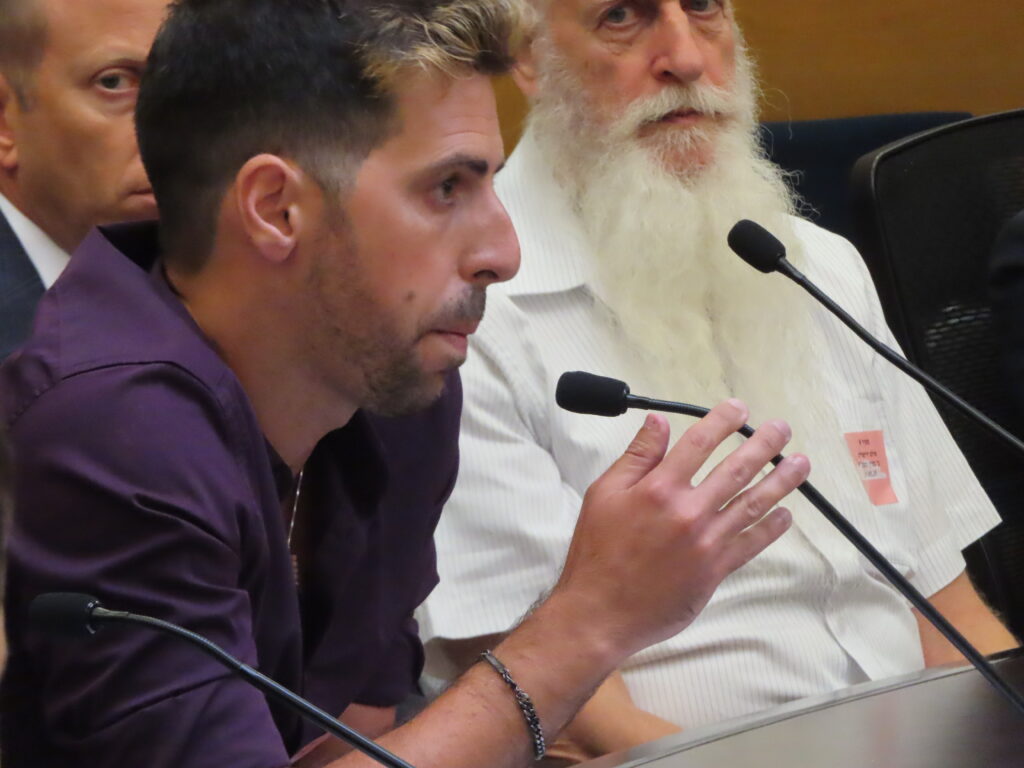
Tom Nisani Beyadenu (Photo courtesy)
Rabbi Tuly Weisz, of Israel365, addressed the caucus.
“Wars are not usually named during the war, but only afterwards,” Rabbi Weisz said. “When Archduke Ferdinand was assassinated in June 1914, no one at the time said this was the beginning of WWI.
“According to Michael Oren, IDF Chief of Staff Yitzchak Rabin was given the honor of naming the 1967 war for the Israelis. From the suggestions proposed, including the War of Daring, War of Salvation, and War of the Sons of Light, he chose the least ostentatious, the Six-Day War, evoking the days of creation.
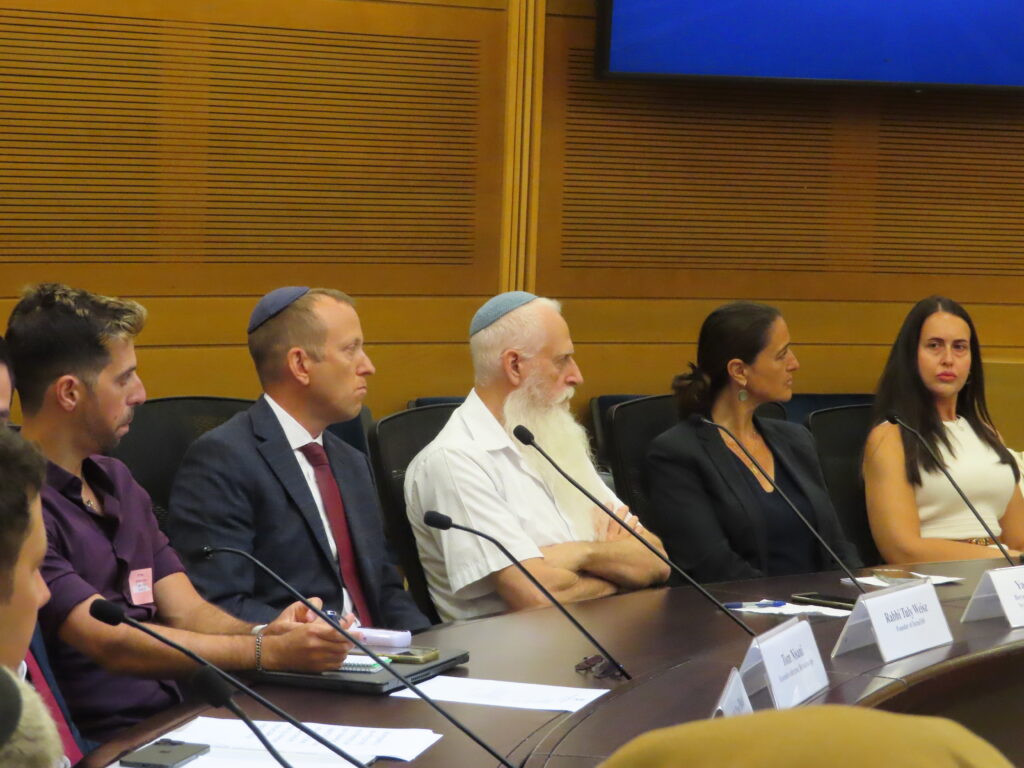
“When this war began, the government gave it a somewhat lame name: Swords of Iron. In December 2023, Netanyahu suggested changing the name, but the proposal did not gain traction.
“As we mark the 58th anniversary of the Six Day War and 600 days of this War, we don’t yet know what we will call this war one generation from now, but what we do know is what our enemies named their attack, well in advance. By paying attention to what our enemies are saying, we can discover something very important.
“Hamas calls this war the al-Aqsa flood. For Hamas, the objective of their October 7 attack was unambiguous: pushing the Jews out ‘from the river to the sea’, but specifically from the very site that gives us our legitimacy here. Their explicit goal was to ‘liberate Al Aqsa’ from the ‘infidel’ Jews.
“Early in the war, Prime Minister Benjamin Netanyahu declared a goal of ‘Total Victory’ against Hamas. Indeed, Israel is finally capturing territory in Gaza. However, our enemy’s name for this operation points to where true victory must be achieved: not in Gaza, but on the Temple Mount.
“In recent months, an anecdote spread about an IDF soldier returning from Gaza. When his relieved mother asked what he wanted to do first, he said he needed to buy a picture of the Beit Hamikdash (Temple) for his bedroom. Surprised, she asked if he wouldn’t prefer a shower or his favorite food. The soldier responded, ‘Eema, you don’t understand. In Gaza, every home, government office, and school displays a picture of the Al-Aqsa Mosque.’
“The seeds of our conflict with the Palestinians go back to the Six-Day War. Despite the total victory of the IDF highlighted by the unification of Jerusalem, to the jubilant cries of “Har Habayit Beyadenu!” (The Temple Mount is in our hands!)Israel capitulated and ceded sovereignty of its holiest site back to the aggressor.
“Israel is the only country to win a war and then lose the negotiations. Jordan has remained in control of the Temple Mount and has only increased its hostility in recent years. This war, however, is changing all that.
“Last summer, Jews started slowly and quietly praying there. Thanks to the work of this caucus and Beyadenu, we’re seeing major shifts taking place. As more Jews and Christians unite in support of prayer rights at the Temple Mount, and with the prospect of more substantial support for Israel with Trump’s return to office, the dream of true religious freedom at Judaism’s holiest site appears closer than ever to becoming reality.
“As we contemplate the lessons for the day after this war, we must remember that our enemies destroy, so we must build. They are trying to shrink us, so we must expand our impact and increase our ownership of the land. They bring destruction and darkness, so we must become an illuminating light unto the nations. All of those who believe in the Bible must respond by doubling down on our efforts to embrace Har Habayit, the Temple Mount.
“With God’s help, and with the leadership of MK Dan Ilouz and Israel’s Knesset, we pray that Israeli sovereignty will extend over our entire Biblical heartland of Judea & Samaria, starting from the heart of the heart: Har Habayit.
MK Dan Illouz also spoke, saying: “This is the first time that such a lobby has been held in English. The Temple Mount is where the Temples stood and where Jews pray every morning. Today, Jews are discriminated against on the Temple Mount, and that needs to change. Our enemies understand what is important, and it is not for nothing that they called the war the ‘Al-Aqsa Flood.’ We will not give up on the Mount. I thank everyone who organized and participated in this important event.”
John Enerson, Cry for Zion: “As a Christian, I want to say that the whole world is watching you. We support your sovereignty on the Temple Mount. If you want it, it is not a fairy tale! We are waiting for the Temple Mount to fulfill its destiny to be a house of prayer for all nations.”
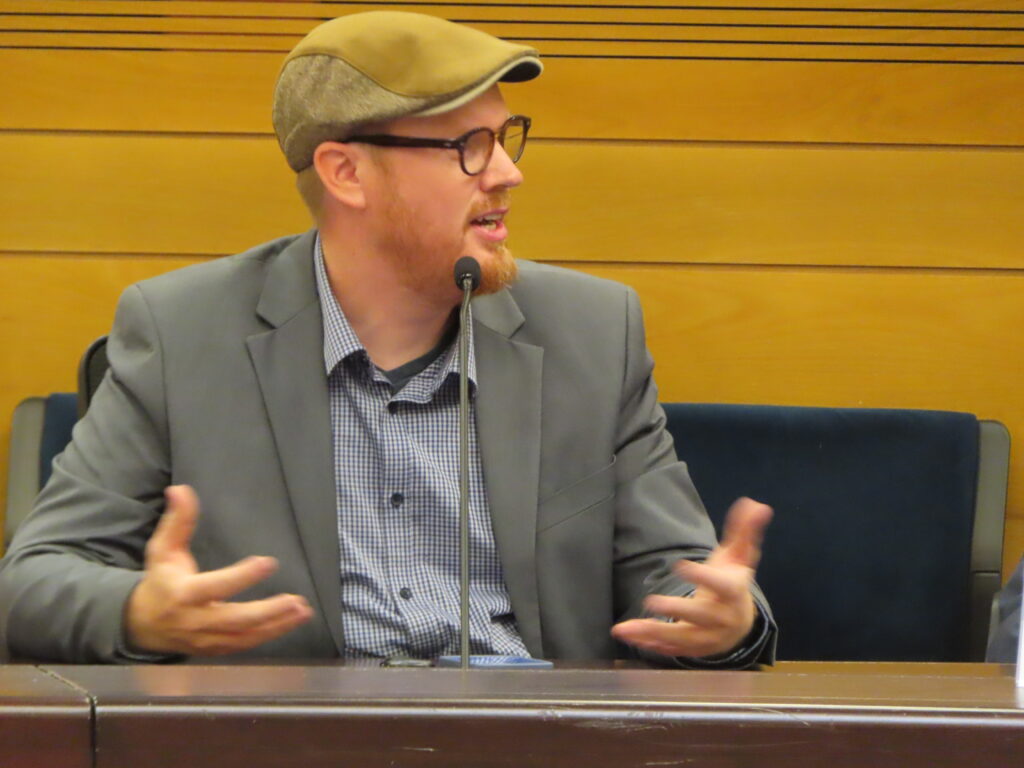
John Enarson/Cry For Zion (Photo courtesy)
MK Amit Halevi said, “I’m honored to be here. I’m even excited. Jerusalem today is stronger than ever and more Jewish than ever, but the heart of Jerusalem – the Temple Mount – is still missing. We must demand that the presence of God and the Temple be restored to the Temple Mount. We need to demand from the American Congress the rights of the Jews on the Temple Mount.”
MK Limor Son Har-Melech: MK Limor played a recording of Captain Harel Sharvit H”YD who spoke about his friend’s merit to go up to the Temple Mount while he was fighting in Gaza. “Today the people of Israel understand more and more what the most important point is: the Temple Mount, even though there are those who are trying to cut it off”. “This is a very important conference. Things have changed for the better on the Temple Mount, but there are still problems and obstacles until the building of the Temple.”
MK Simcha Rotman: “Yesterday we passed a resolution in the Knesset for sovereignty in Judea and Samaria, by consensus. It’s very important, but it’s very lacking without the Temple Mount. It can’t be cut off. There is a great awakening of worshippers on the Temple Mount today. We have to continue.”
Nili Nehurai, Israel is Forever: “We have been fighting for years for Jewish freedom on the Temple Mount, we were arrested and expelled, but we always continued. There is no reason why Jews cannot pray on the Temple Mount or wave a flag. This is our time to act as the owners of the house. It is ours and ours alone!”
Signs of the Times
Scientists Worry European Supervolcano Is ‘Awakening’

Scientists tell us that there are 20 super volcanoes on Earth, but there hasn’t been a major eruption of any of them in any of our lifetimes. Unfortunately, seismic activity is on the rise all over the globe, and we are being warned that the Campi Flegrei super volcano in Italy is “awakening”. 5th Trumpet Rehearsals
Curiosity With The Occult: Flirting With Darkness In The Name Of “Fun”

According to Pew Research’s latest report, a staggering 30% of the World Population. adults admit to consulting astrology, tarot cards, or fortune tellers at least once a year. Even more alarming, 43% of women between the ages of 18 and 49 say they believe in astrology.
Boston Marathoner Kicked Off Team For Speaking Out About Transgender Runners

New mom and marathoner Natalie Daniels was booted from her running club for saying that people who identify as transgender should not compete against biological women in sports.
Gog and Magog Update
Israel the Leader in Lazer Weapons

Israel has become the first country to deploy high-power laser systems in combat, successfully intercepting scores of active enemy threats, the Defense Ministry announced on Wednesday.
“The State of Israel is the first in the world to demonstrate large-scale operational laser interception capabilities, said Brig. Gen. (Ret.) Dr. Daniel Gold, head of the ministry’s Directorate of Defense Research & Development (DDR&D).
Combat units, he said, “displayed boldness in integrating and carrying out the first successful operational deployments of the systems, and the lessons learned will be applied as we deploy more operational laser systems.”
The laser systems used during the war are precursors to the more powerful Iron Beam, a directed energy weapon expected to be delivered to the Israel Defense Forces later this year.
The Iron Beam, also developed by Rafael, uses adaptive optics and high-energy lasers to intercept a range of aerial threats quickly and at a fraction of the cost of traditional missile interceptors.
“We will continue to advance this technology and deliver world-leading systems and capabilities to the IDF, turning vision into security in air, sea, land, and across every dimension,” Gold said.
Brig. Gen. Yehuda Elmakayes, head of the DDR&D’s Research and Development Division, described the deployment as a critical learning experience.
“During the war, we deployed several high-power laser system prototypes, resulting in significant achievements, culminating in the world’s first successful high-power laser interceptions on the battlefield,” he said.
“We are currently integrating these insights into the systems under development, while expanding the range of laser-based systems to protect Israeli civilians and IDF forces.”
Lead contractor for the project is the Haifa-based Rafael Advanced Defense Systems.
“Israel is the first country in the world to transform high-power laser technology into a fully operational system – and to execute actual combat interceptions,” said Dr. Yuval Steinitz, Rafael’s chairman.
“This is a game-changer with an unprecedented impact on the modern battlefield.”
The laser systems are expected to be integrated into the Iron Dome system. Algorithms will determine when to activate the lasers and when to fire the kinetic Iron Dome interceptors, known as Tamir missiles.
In addition to being considerably cheaper than traditional air defenses, laser systems do not need replenishment. Furthermore, the laser strikes its target within seconds, far faster than kinetic interceptors.
Places in the Bible
Petra
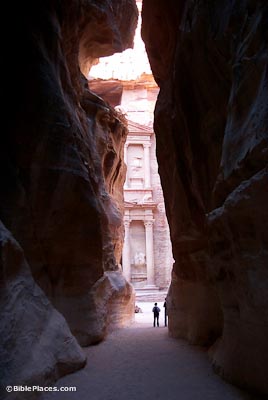
The Siq
Petra was chosen as the capital of the Nabateans because it was located in a valley surrounded by sandstone mountains. There are many ways to get into Petra, but none of them are easy, and if the valleys are sealed, it is almost impossible for anyone to enter. The main entrance to Petra is called the Siq; it has sides as high as 650 feet (200 m). This gorge and the tomb facade at the end of it (the Kazneh) were popularized in American culture in the movie Indiana Jones and the Last Crusade.
Knowledge of Petra had been lost to the western world until John Lewis Burckhardt tricked his Bedouin guides into leading him there in 1812.
The Kazneh
Of the 800 carved tombs in Petra, the Kazneh is the most famous. Its name Kazneh means “treasure” and comes from the Bedouin belief that the Pharaoh chasing the Israelites hid his treasure in the urn at the top of the Kazneh. Tomb facades were built from the top down. Scaffolding was built and then grooves were carved into the rock. Into these grooves were inserted pieces of wood, which when made wet, expanded and cracked the rock.
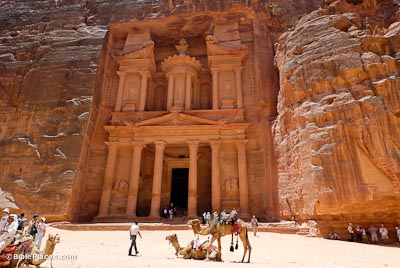
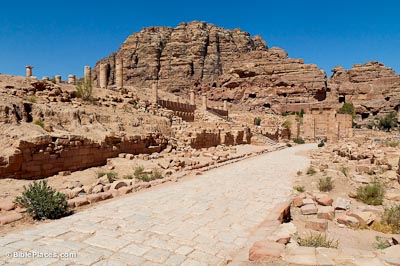
Main Street
As many as 30,000 people may have lived in Petra during the 1st century AD. It is a misconception that Petra was a city only for the dead. A large earthquake in AD 363 destroyed at least half of the city. Petra never recovered from this destruction.
The Monastery
The Monastery is the largest tomb façade in Petra, measuring 160 feet (50 m) wide and 150 (45 m) high. Despite its name, it was built as a tomb monument and may have acquired its name from the crosses inscribed inside. Like the Kazneh, the structure consists of two stories topped by a magnificent urn. The architectural detail of the Kazneh is not evident in this building.
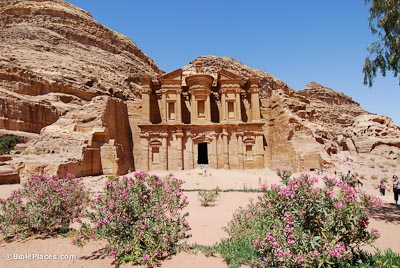
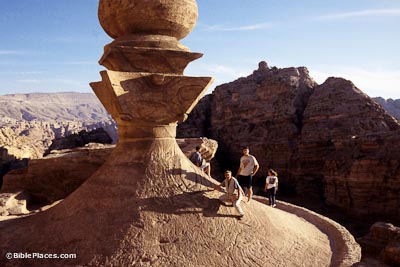
Monastery Top
Scholars debate who the designers and builders of the tombs of Petra were. They were probably the product of local workers and artisans brought in from Alexandria and Rome. The monuments are Nabatean in style, but they incorporate classical, Egyptian, and Mesopotamian elements.
Jebel Haroun
In Bedouin tradition, Jebel Haroun is Mt. Hor where Moses’ brother Aaron was buried. Most scholars reject this, locating Mt. Hor near Kadesh-barnea to the west. Some believe that Petra may be Sela in the Old Testament, largely because of the meaning of the name (2 Kgs 14:7; Isa 16:1). Sela is “rock, cliff, fissure” in Semitic cognates, and Petra is “rock” in Greek. Others place Sela just north of Bozrah or believe it to be a general reference meaning “the rock, cliff.”

HEALING ARTICLES AND PRAYER

TruLight Ministries offer a Wide Range of EYE OPENING Healing Articles and various Illnesses . Cancers and other Chronic Illness :
To Start this New Line of Study , we will Start with the 28 Blocks why Christians does not receive Healing and then we will move to other Topics and handle every Illness and even address All Cancers, If you want to walk this Journey of Healing with Is . Then 1st Handle all off the 28 Healing Blocks , Then Daily Pray the Prescription Prayer for Healing attached : Follow the Steps and Faith Actions Clearly
https://trulightradioxm.org.za/healing-articles/28-reasons-why-some-people-are-not-healed
TruLight Ministries bied ‘n wye reeks OOGOPENENDE Genesingsartikels en verskeie siektes. Kankers en ander chroniese siektes:
Om hierdie nuwe studierigting te begin, sal ons begin met die 28 blokke waarom Christene nie genesing ontvang nie en dan sal ons na ander onderwerpe beweeg en elke siekte hanteer en selfs alle kankers aanspreek. As jy hierdie reis van genesing met jou wil stap, hanteer dan eers al die 28 genesingsblokke, en bid dan daagliks die aangehegte voorskrifgebed vir genesing: Volg die stappe en geloofsaksies duidelik.
https://trulightradioxm.org.za/healing-articles/28-hindernisse-teen-jou-genesing
https://endtimeprayers.co.za/die-genesings-gebed-vir-uself
Dr Michelle Strydom MD – Healing begins with Sanctification of the Heart – 19 Video Teachings . One Video per Day

Dr Michelle Strydom trained and qualified as a medical doctor in South Africa and her desire is to practice medicine for the glory of God and leave behind a legacy of His love. She authored Healing Begins with Sanctifcation of the Heart and uncovers the foundation of disease by providing insight, from both a medical and Biblical perspective, into the spiritual, psychological and physical mechanisms that produce ill health. Her teaching demonstrates how latest medical research confirms Biblical principles of health and disease and reveals how coming back in line with His Word through repentance and sanctification helps us to overcome illness, be healed and made whole.
Teaching 1 = INTRODUCTION (NO DISEASE IS INCURABLE)
TruLight Ministry News

TruLight Ministries orders from God since 2012 . Teach Them , Comfort Them and Warn Them!
////////////
TruLight Ministries opdrag vanaf God sedert 2012. Leer hulle, Troos hulle en Waarsku hulle!
Die week se Lering – Die 12 Stappe na die Hemel / 12 Steps to Heaven
TruLight School of Theology have started with Its daily Bible Study – Pastor Counselling Certificate – we are Starting with 36 Studies with 10 Studies per Topic from 1st of April 2025 – Over the Next 2 Years we will Include One Daily Study per Topic on this Platform. The Daily Manna Bible Study will be Available in English and Afrikaans!
We will Start with a 68 week Study on “Know Your Bible” Daily Bible Summaries of every Chapter in the Bible! From the Old Testament to the New Testament , from Genesis to Revelation 66 Books of the Bible.
Started 1st April 2025
This is our Study Principals:
SOAP
Scripture: Read a short passage out loud.
Observation: What do you notice about the verses?.
Application: How can you apply this to your life?.
Prayer: Pray about what you’ve learned.
REAP
Read: Read the passage carefully.
Engage: Ask questions about the passage.
Apply: Think about how the passage applies to your life.
Pray: Pray about what you’ve learned.
Introduction to the Bible – Bible Summary
Summary of the Book of
Colossians
Author: The apostle Paul was the primary writer of the Book of Colossians (Colossians
1:1). Timothy is also given some credit (Colossians 1:1).
Date of Writing: The Book of Colossians was likely written between A.D. 58-62.
Purpose of Writing: Paul wrote Colossians to warn the believers of doctrinal error and
to spur them to continued growth in Christ. The first half of the Book of Colossians is a
theological treatise that includes one of the most profound presentations
of Christology anywhere in the New Testament. The second half is a mini-ethics course,
addressing every area of Christian life. Paul progresses from the individual life to the
home and family, from work to the way we should treat others. The theme of this book
is the Lordship of Jesus Christ and His sufficiency in meeting our needs in every area.
Key Verses:
Colossians 1:15-16, “He is the image of the invisible God, the firstborn over all creation.
For by Him all things were created: things in heaven and on earth, visible and invisible,
whether thrones or powers or rulers or authorities; all things were created by Him and
for Him.”
Colossians 2:8, “See to it that no one takes you captive through hollow and deceptive
philosophy, which depends on human tradition and the basic principles of this world
rather than on Christ.”
Colossians 3:12-13, “Therefore, as God’s chosen people, holy and dearly loved, clothe
yourselves with compassion, kindness, humility, gentleness and patience. Bear with each
other and forgive whatever grievances you may have against one another. Forgive as
the Lord forgave you.”
Colossians 4:5-6, “Be wise in the way you act toward outsiders; make the most of every
opportunity. Let your conversation be always full of grace, seasoned with salt, so that
you may know how to answer everyone.”
Brief Summary: Colossians was written explicitly to defeat the heresy that had arisen in
Colosse, which endangered the existence of the church. While we do not know what was
told to Paul, this letter is his response.
We can surmise based on Paul’s response that he was dealing with a defective view of
Christ (denying His real and true humanity and not accepting His full deity). Paul
appears also to dispute the “Jewish” emphasis on circumcision and traditions (Colossians
2:8-11; 3:11). The heresy addressed appears to be either a Jewish-Gnosticism or a mix
between Jewish asceticism and Greek (Stoic?) philosophy. He does a remarkable job in
pointing us to the sufficiency of Christ.
The Book of Colossians contains doctrinal instruction about the deity of Christ and false
philosophies (1:15-2:23), as well as practical exhortations regarding Christian conduct,
including friends and speech (3:1-4:18).
Connections: As with all the early churches, the issue of Jewish legalism in Colosse was
of great concern to Paul. So radical was the concept of salvation by grace apart from
works that those steeped in Old Testament law found it very difficult to grasp.
Consequently, there was a continual movement among the legalists to add certain
requirements from the law to this new faith. Primary among them was the requirement
of circumcision which was still practiced among some of the Jewish converts. Paul
countered this error in Colossians 2:11-15 in which he declares that circumcision of the
flesh was no longer necessary because Christ had come. His was a circumcision of the
heart, not the flesh, making the ceremonial rites of the Old Testament law no longer
necessary (Deuteronomy 10:16, 30:6; Jeremiah 4:4, 9:26; Acts 7:51; Romans 2:29).
Practical Application: Although Paul addresses many areas, the basic application for us
today is the total and complete sufficiency of Christ in our lives, both for our salvation
and our sanctification. We must know and understand the gospel so as not to be led
astray by subtle forms of legalism and heresy. We must be on guard for any deviation
that would diminish the centrality of Christ as Lord and Savior. Any “religion” that tries
to equate itself with the truth using books that claim the same authority as the Bible, or
which combines human effort with divine accomplishment in salvation must be avoided.
Other religions cannot be combined with or added to Christianity. Christ gives us
absolute standards of moral conduct. Christianity is a family, a way of life, and a
relationship—not a religion. Good deeds, astrology, occultism and horoscopes do not
show us God’s ways. Only Christ does. His will is revealed in His word, His love letter to
us; we must get to know it!
Inleiding tot die Bybel – Bybel Samevatting
Opsomming van die Boek
Kolossense
Skrywer: Die apostel Paulus was die primêre skrywer van die Boek Kolossense (
Kolossense 1:1 ). Timoteus word ook ‘n mate van krediet gegee ( Kolossense 1:1 ).
Datum van Skrywe: Die Boek Kolossense is waarskynlik tussen 58-62 nC geskryf.
Doel van die skryf: Paulus het Kolossense geskryf om die gelowiges te waarsku teen
leerstellige dwaling en om hulle aan te spoor tot voortgesette groei in Christus. Die
eerste helfte van die Boek van Kolossense is ‘n teologiese verhandeling wat een van die
mees diepgaande aanbiedings van Christologie op enige plek in die Nuwe Testament
insluit. Die tweede helfte is ‘n mini-etiekkursus wat elke area van die Christelike lewe
aanspreek. Paulus vorder van die individuele lewe na die huis en gesin, van werk na die
manier waarop ons ander moet behandel. Die tema van hierdie boek is die heerskappy
van Jesus Christus en Sy genoegsaamheid om in ons behoeftes op elke gebied te
voorsien.
Sleutelverse:
Kolossense 1:15-16 , “Hy is die Beeld van die onsienlike God, die Eersgeborene bo die
hele skepping, want deur Hom is alle dinge geskape: die dinge in die hemel en op die
aarde, wat sienlik en onsienlik is, trone sowel as magte of owerhede of owerhede is deur
Hom en vir Hom geskep.”
Kolossense 2:8 , “Sorg dat niemand julle gevange neem deur ‘n hol en bedrieglike
filosofie nie, wat afhang van menslike tradisie en die grondbeginsels van hierdie wêreld
eerder as van Christus.”
Kolossense 3:12-13 “Daarom, as God se uitverkore volk, heilige en geliefdes, beklee julle
met medelye, vriendelikheid, nederigheid, sagmoedigheid en geduld. Verdra mekaar en
vergewe al die griewe wat julle teen mekaar mag hê. Vergewe soos die Here het jou
vergewe.”
Kolossense 4:5-6 , “Wees wys in die manier waarop jy teenoor buitestanders optree;
maak die beste van elke geleentheid. Laat jou gesprek altyd vol genade wees, met sout
besprinkel, sodat jy kan weet hoe om almal te antwoord.”
Kort opsomming: Kolossense is uitdruklik geskryf om die dwaalleer wat in Kolosse
ontstaan het , wat die bestaan van die kerk in gevaar gestel het, te oorwin. Alhoewel ons
nie weet wat aan Paulus gesê is nie, is hierdie brief sy antwoord.
Ons kan aanneem op grond van Paulus se reaksie dat hy te doen het met ‘n gebrekkige
siening van Christus (wat Sy ware en ware menslikheid ontken en nie Sy volle godheid
aanvaar nie). Paulus betwis ook die “Joodse” klem op die besnydenis en tradisies (
Kolossense 2:8-11 ; 3:11 ). Die dwaalleer wat aangespreek word, blyk óf ‘n Joodsgnostisisme
óf ‘n mengsel tussen Joodse asketisme en Griekse (Stoïsynse?) filosofie te
wees. Hy doen ‘n merkwaardige werk deur ons te wys op die genoegsaamheid van
Christus.
Die Boek Kolossense bevat leerstellige onderrig oor die godheid van Christus en valse
filosofieë (1:15-2:23), sowel as praktiese vermanings rakende Christelike gedrag,
insluitend vriende en spraak (3:1-4:18).
Verbindings: Soos met al die vroeë kerke, was die kwessie van Joodse wettisisme in
Kolosse vir Paulus ‘n groot kommer. So radikaal was die konsep van verlossing deur
genade afgesien van werke wat diegene wat deurdrenk was van Ou-Testamentiese wet
dit baie moeilik gevind het om te begryp. Gevolglik was daar ‘n voortdurende beweging
onder die wettisiste om sekere vereistes uit die wet by hierdie nuwe geloof te voeg.
Primêr onder hulle was die vereiste van besnydenis wat steeds onder sommige van die
Joodse bekeerlinge beoefen is. Paulus het hierdie dwaling teëgewerk in Kolossense
2:11-15 waarin hy verklaar dat die besnydenis van die vlees nie meer nodig was nie
omdat Christus gekom het. Syne was ‘n besnydenis van die hart, nie die vlees nie, wat
die seremoniële rituele van die Ou-Testamentiese wet nie meer nodig het nie (
Deuteronomium 10:16 , 30:6 ; Jeremia 4:4 , 9:26 ; Handelinge 7:51 ; Romeine 2 :29 ).
Praktiese toepassing: Alhoewel Paulus baie terreine aanspreek, is die basiese
toepassing vir ons vandag die totale en volkome genoegsaamheid van Christus in ons
lewens, beide vir ons verlossing en ons heiligmaking. Ons moet die evangelie ken en
verstaan sodat ons nie deur subtiele vorme van wettisisme en dwaalleer om die bos
gelei word nie. Ons moet op ons hoede wees vir enige afwyking wat die sentraliteit van
Christus as Here en Verlosser sal verminder. Enige “godsdiens” wat probeer om homself
met die waarheid gelyk te stel deur boeke te gebruik wat aanspraak maak op dieselfde
gesag as die Bybel, of wat menslike inspanning kombineer met goddelike prestasie in
verlossing, moet vermy word. Ander gelowe kan nie gekombineer word met of
bygevoeg word tot die Christendom nie. Christus gee ons absolute standaarde van
morele gedrag. Christenskap is ‘n gesin, ‘n manier van lewe en ‘n verhouding—nie ‘n
godsdiens nie. Goeie dade, astrologie, okkultisme en horoskope wys ons nie God se weë
nie. Net Christus doen. Sy wil word geopenbaar in Sy woord, Sy liefdesbrief aan ons; ons
moet dit leer ken!
Share this Feeding of Manna with your Friends and Family. just click on the Social Media icon and share !